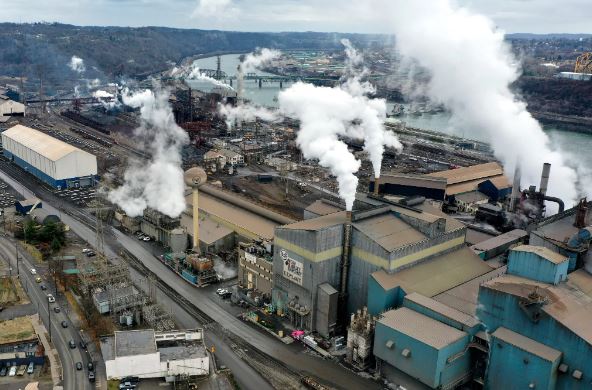President Biden is facing mounting pressure from environmental organizations to intervene and prevent the acquisition of U.S. Steel by Nippon Steel, a move that activists argue could hinder America’s efforts to combat climate change. The proposed merger has sparked concerns among environmentalists, who claim that it would unite two steel giants known for their reliance on fossil fuels and slow progress in transitioning to cleaner energy sources.
According to researchers at Industrious Labs, both Nippon Steel and U.S. Steel rank as significant emitters of greenhouse gases due to their reliance on coal-powered blast furnaces. The merger, they warn, could exacerbate emissions, with three U.S. Steel facilities emitting more greenhouse gases annually than several coal-fired power plants combined. Despite assurances from both companies that they are committed to decarbonization by 2050, environmentalists remain skeptical of their efforts, citing the slow pace of transition and reliance on unproven technologies.
In a joint statement, Nippon Steel and U.S. Steel defended the merger as a means to create a stronger and more competitive global entity. They emphasized their shared commitment to sustainability and asserted that the deal would advance their efforts to address environmental challenges. However, environmental groups argue that the merger could impede progress towards a greener future by perpetuating high emissions levels at U.S. Steel’s coal-powered plants.
The proposed acquisition has also attracted bipartisan scrutiny, with senators from both parties expressing concerns about its potential impact on American workers and national security. Lawmakers fear that the merger could result in plant closures and job losses, undermining the nation’s defense industrial base. The United Steelworkers Union has voiced objections to the deal, raising fears of layoffs among its members.
Former President Donald J. Trump has also weighed in on the matter, stating his intention to block the sale if he were still in office. The Biden administration has indicated that it is reviewing the acquisition, with Lael Brainard, head of the National Economic Council, suggesting that the Committee on Foreign Investment in the United States (CFIUS) would likely scrutinize the deal. However, administration officials have refrained from confirming whether a formal review is underway.
Environmental groups argue that allowing the merger to proceed could have far-reaching consequences for the transition to clean energy. They contend that Nippon and U.S. Steel’s modest decarbonization efforts fall short of the ambitious action needed to address climate change effectively. Concerns have been raised about the companies’ continued reliance on coal-fired blast furnaces and their slow adoption of advanced emissions-reducing technologies.
Despite their stated commitment to decarbonization, Nippon and U.S. Steel face skepticism from environmental advocates, who question the feasibility of their plans and urge more ambitious action. The proposed acquisition has reignited debate over the future of the steel industry and its role in the transition to a low-carbon economy.
Critics argue that the deal could hinder innovation and investment in green technologies, ultimately jeopardizing American competitiveness in the global market for sustainable steel. While some analysts view Nippon Steel’s investment as an opportunity to modernize U.S. Steel’s operations, others caution that it could perpetuate reliance on outdated infrastructure and impede progress towards a cleaner, more sustainable future.
As the Biden administration weighs its options, environmental groups continue to push for greater scrutiny of the merger and advocate for stricter environmental standards in the steel industry. They emphasize the importance of ensuring that any deal aligns with the administration’s climate goals and fosters innovation in clean energy technologies.

